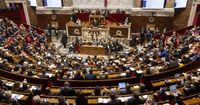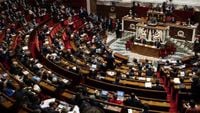In a significant move on May 7, 2025, the Assemblée nationale announced the temporary exclusion of two deputies, Andy Kerbrat from La France insoumise (LFI) and Christine Engrand, formerly of the Rassemblement national (RN), for their misuse of parliamentary expenses. The decision, which is the most severe sanction available under parliamentary rules, was reached unanimously by the bureau of the Assemblée and subsequently confirmed in a vote held in the hémicycle.
The sanction entails a fifteen-day exclusion during which both deputies will be barred from participating in any parliamentary activities and will also face a reduction of half their parliamentary indemnity for two months. This reduction amounts to a loss of €3,746 per month from a total indemnity of €7,493, highlighting the serious nature of their infractions.
This unprecedented action stems from findings that both deputies had improperly utilized their advance of mandate expenses (AFM) for personal gain, a clear violation of ethical guidelines. Specifically, Kerbrat was implicated in an investigation by Mediapart that revealed he had drawn from his AFM to fund his drug purchases. He was arrested in October 2024 while attempting to buy 3-MMC, a synthetic drug, in the Paris metro. Although Kerbrat denies using public funds for his addiction, he admitted to poor management of his expenses.
In a statement, he expressed his willingness to accept the sanction, clarifying, "I have not been sanctioned for using public money to buy drugs. I have never used my mandate expenses envelope to finance my addiction, never." Despite his claims, the Assembly's ethics officer confirmed that Kerbrat had reimbursed nearly 95% of the improperly charged expenses from June 2022 to November 2024.
Engrand's case is equally concerning. She was also highlighted in a Mediapart report in September 2024 for spending her AFM on unrelated personal expenses, including a dating site subscription, funeral costs, and the pension for her two dogs. Following these revelations, she faced a six-month suspension from the RN and was ultimately expelled from the party in March 2025. Like Kerbrat, Engrand has reportedly reimbursed the misappropriated funds, as confirmed by the ethics report.
Yaël Braun-Pivet, the president of the Assemblée nationale, underscored the gravity of the situation, stating that the decision sends a strong message regarding the accountability of elected officials. She noted, "No misuse of the resources allocated for their mandate can be tolerated." This sentiment was echoed across the political spectrum, with deputies from various parties recognizing the need for exemplary conduct among parliamentarians.
The unanimous decision to impose these sanctions is a rare occurrence in the Assemblée, indicating a collective commitment to uphold the integrity of the institution. Since 2022, such severe penalties have only been applied a handful of times, reflecting a growing intolerance for unethical behavior among elected officials.
In the past, notable cases include the 2011 sanction of former deputy Maxime Gremetz, who faced exclusion for threatening fellow parliamentarians, and the 2022 sanction of Grégoire de Fournas for racially charged comments during a parliamentary session. These precedents illustrate the Assemblée's willingness to act decisively against misconduct, reinforcing the expectation of high ethical standards.
The recent actions against Kerbrat and Engrand highlight the ongoing scrutiny of parliamentary expenses, particularly in light of previous scandals that have undermined public trust in elected officials. The Assembly's ethics officer, Jean-Eric Gicquel, had previously called for stricter controls and transparency regarding the use of AFM, emphasizing the importance of maintaining the honor of the national representation.
As the political landscape evolves, the repercussions of these sanctions could resonate beyond the immediate penalties faced by the two deputies. The Assembly's commitment to ethical governance may influence future legislative measures aimed at enhancing accountability and transparency among parliamentarians.
In conclusion, the temporary exclusion of Andy Kerbrat and Christine Engrand serves as a stark reminder of the responsibilities that come with public office. Their cases underscore the necessity for elected officials to adhere strictly to ethical standards and the consequences that arise when those standards are breached. As the Assemblée nationale moves forward, the hope is that these actions will foster a renewed commitment to integrity among all lawmakers.






